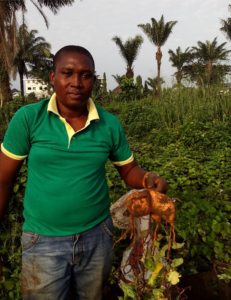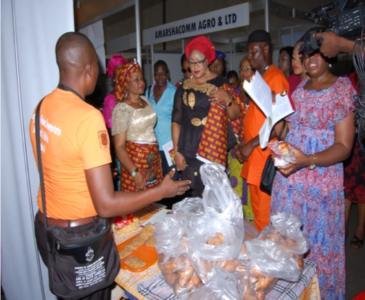Micronutrient malnutrition is widespread in Nigeria, particularly vitamin A deficiency, which affects at least 30% of the population. Women of reproductive age, infants and young children mostly are vulnerable to micronutrient malnutrition. Many of them suffer multiple deficiencies of essential micronutrients such as vitamin A, iron and zinc, which can result in an array of health problems and even early death. Most of the people affected by micronutrient malnutrition do not show the physical symptoms usually associated with malnourishment, hence the deficiency is commonly referred to as ‘hidden hunger’.
Nigeria, together with partners such as the Building Nutritious Food Baskets Project (BNFB), is using innovative approaches to tackle hidden hunger. Gift Buduzhi Oguzor, a community nutritionist, is leading one such effort, championing efforts to scale up nutritious, vitamin A rich orange-fleshed sweetpotato (OFSP) in Rivers state.

Gift was among the beneficiaries of a 10-day training of trainers (ToT) course on ‘Everything you ever wanted to know about sweetpotato’, supported by BNFB, that occurred in March 2017. The course was organized and hosted by the Agricultural and Rural Management Training Institute (ARMTI), in Ilorin. ARMTI has partnered with the International Potato Center (CIP) since 2012, first through the Reaching Agents of Change (RAC) Project, then the Jumpstarting OFSP through Diversified Markets in West Africa Project and most recently BNFB. The course adopts adult learning methodology emphasizing learning by doing and discovery. It covers 14 topics on the sweetpotato value chain, including production, utilization and investment.
Gift’s accomplishments in promoting OFSP are facilitated by the model BNFB adopts to reach a critical mass of farmers producing and consuming OFSP. In Nigeria, BNFB’s cascading model for capacity development involves having primary facilitators at ARMTI train agricultural, nutrition, health, marketing, and gender experts. These experts then become the secondary facilitators, and they, in turn, facilitate a shorter and contextualized step-down course to different target audiences, and these become the tertiary facilitators. This approach continues until the trainers reach the end-users in their communities.
Gift’s training equipped him to be a secondary facilitator and a champion for OFSP in Rivers state. He has shared his skills and knowledge with extension workers, food processors, farmers and other stakeholders in the sweetpotato value chain for wide impact. By March 2018, he had reached more than 275 agents of change with training, with little support from BNFB. Consequently, more than 1500 households are now growing and accessing OFSP. The area covered by OFSP currently is over 7 hectares in Rivers and Bayelsa states. Some of the farmers cultivating it include the special adviser to Rivers state governor, who is growing OFSP on his farm —3 plots of about 100 m by 50 m —and intends to increase this investment.
As a community nutritionist and advocate of quality nutrition, I feel that integrating OFSP in my work has really helped me to supply a safe, micronutrient-dense food and to ultimately contribute to reducing hidden hunger in my country. OFSP is a sustainable and cost-effective way of addressing vitamin A deficiency especially in children and women of reproductive age. Working with various stakeholders to develop their capacity and increase nutritional knowledge has helped stimulate action relating to production and consumption of OFSP in Nigeria. (Gift Buduzhi Oguzor)
Gift’s other role as one of the national advocates for biofortification has seen him benefit from various capacity strengthening initiatives to enhance his skills in advocacy for policy engagement, in raising new investment for OFSP and in promoting the nutritious food basket of biofortified crops as a solution to hidden hunger. His advocacy and awareness creation efforts have inspired other actors in the OFSP value chain. For example, some retail outlets such as SPAR supermarket and Fruit Garden market in Port Harcourt are stocking and promoting consumption of OFSP. This improved OFSP access has increased its demand and so more of it is being produced. Some actors are processing for sale OFSP products such as juice, bread, doughnuts, cookies, chin-chin (a fried snack made of wheat flour and OFSP puree dough) etc. In addition, biofortification in now included in Rivers state’s food and nutrition policy and OFSP has been added to the menu of the Home-Grown School Feeding Program, which is in the process of implementation.

Gift is involved also in organizing and hosting media campaigns. With support from the Director of Extension Services in Agriculture Development Program, Rivers state, he has worked with Rivers State Television to create awareness among households on the production, processing, utilization and value addition of OFSP, and promoted its adoption, acceptance and consumption.
The huge impact of Gift’s work extends beyond his home state of Rivers to other BNFB pilot states like Enugu, Kogi, Ogun and Taraba. His achievements demonstrate the emerging impact and sustainability of RAC and BNFB’s objectives. The approach of using national advocates like Gift has been vital in the creation of a favorable policy environment, the raising of new investment to support biofortification programs and initiatives, and the scaling up of biofortification. All these are essential in addressing vitamin A deficiency among young children, women of reproductive age and men.
Gift’s efforts demonstrate that institutional and community capabilities have been strengthened for the production and consumption of OFSP. The aim is to ultimately have an adequate number of passionate and committed agents of change who can organize themselves to drive their own agenda, mainstream biofortified crops into their ongoing programs and activities. These agents will also continue to pass down the skills they acquire to the OFSP end-users, who are the smallholder farmers, small and medium processors, and marketers.
About BNFB
The Building Nutritious Food Baskets (BNFB) project is a three-year project (November 2015 to October 2018) implemented in Nigeria and Tanzania and funded by the Bill & Melinda Gates Foundation. The goal of the project is to accelerate and support scaling up of biofortified crops for food and nutrition security and to help reduce hidden hunger by catalyzing sustainable investment for the utilization of biofortified crops (OFSP, PVA maize, high iron beans and vitamin A cassava) at scale. BNFB develops institutional, community and individual capacities to produce and consume biofortified crops. The objectives of the project are to strengthen the enabling environment for increased investments in biofortified crops and to develop institutional and individual capacities to produce and consume biofortified crops.
Article written by Joyce Maru - Capacity Building and Communication Specialist - BNFB
